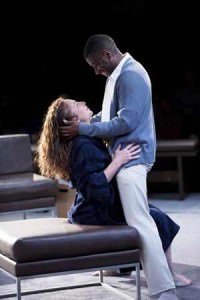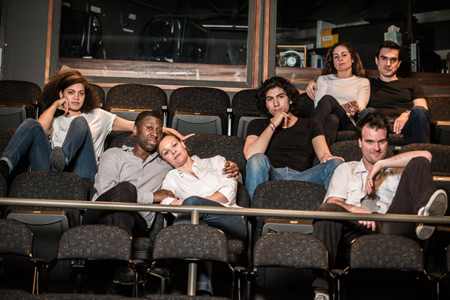Does art influence life? Or, is life imitating the art?
What is love and at it what cost?
What is right? What is real?
It’s all a game of sorts.
The Studio Theatre in its final production of the 2012-2013 subscription season presents Tom Stoppard’s affecting award-winning drama, The Real Thing, in Studio’s most intimate space, The Milton Theatre. Directed by David Muse, the 1984 Tony Award Winner for Best Play (beating out David Mamet’s Glengarry Glen Ross) is staged in-the-round which required re-leveling the floors, moving seats, and creating a rotating circular set center to ease scene and set changes.

The in-the-round presentation magnifies the power and focus of Stoppard’s words and the emotional enrapture of the gripping and enthralling performances.The cast dazzles with passion and conviction, and the precision of Muse’s bracing direction has created an electrifying connection with the audience that is undeniable.
The Real Thing opens with a scene that is not what it seems to be, and the storyline is relentlessly clever and complicated at times, but the emotions are basic and real. The complex monologues can be hypnotic, but there you are, hanging onto every word. The synergy between emotional charge and intellectual challenge is why I love the theater! The Real Thing is the real deal, and as much as this play is a cerebral experience, what stays with you are the feral emotional reflexes that resonate and fill the connection between your heart and mind.
The Real Thing is the soul search for truth about love, passion, and marriage, and the skewed perceptions of those ideals when they encounter conflict, betrayal and lies. The strength of the play is the exploration of the delicacies and vulnerabilities of relationships, with the conceit that having all the answers is not the definition of life or happiness. Rather, it’s the messy bits of discovery and ultimately the journey, that makes life full bloom.
But for many, we want, what we want.
Henry is the focus of The Real Thing, who much like Stoppard, is a successful playwright. Set in London in the early eighties, the play begins with two marriages and four friends. Henry who is married to an actress, Charlotte, and Max is married to Annie, both who are also actors. Infidelities are discovered and the play follows the dissolution of these two marriages and the aftermath, using a play within a play device to set it up and illustrate throughout.
Henry and Annie have fallen in love and it’s not long before they get married.
Can trust, faithfulness, and honor survive the repercussions of their earlier infidelities?
Is this new love ‘‘the real thing’’?
Teagle F. Bougere gives a towering performance as the dramatic, righteous, and contentedly confident Henry. Bougere makes his second Studio Theatre appearance of the season, after his tour de force performance as the title character in the Helen Hayes Award-winning (for Outstanding Ensemble in a Resident Play) production of The Invisible Man. In The Real Thing, Bougere is in command of his character, Stoppard’s’ text, and the passion and physicality of his performance. His timing and delivery are magnetic. Teagle F. Bougere’s talent is mammoth.
The phenomenon of a reputation is a delicate one. Henry is a celebrated playwright and is seduced by his work. For him life is literary, and his life is art.“I don’t think writers are sacred, but words are,” Henry says. “Words are innocent, neutral and precise.”
Words are Henry’s comfort zone and he hides behind his wit and his linguistic virtuosity, but the search and struggle with the truth of his heart remains. The pop-song-loving Henry (who is limited in Opera knowledge) is a romantic who easily says “I love you,” but falters to find the right language to write a play about his love for Annie – a play that he’s promised her. He can vocalize the words but wallows to express his feelings in writing.
Is this “the real thing?”
Throughout the play Henry prefers “the right” because to him “the real” is only a perception. He questions, how real is love and any other philosophy. He believes, “nothing except our perceptions of them,” he says. Despite his command of language, Henry has no command over himself. Uncertainty and his search for “the real thing” are.
To the world Henry is the literate man who has the perfect phrase for any occasion. On the inside what Bougere’s performance shows us that the facade of control is exactly that – a facade. So Henry, as do many, focuses on the things he can control – like make a Top 8 List of Desert Island Records (in one of the fun-loving moments in The Real Thing).
The forthright nuances of Annie Purcell’s (Annie) performance pulsates and personifies the many complexities of marriage and the rigors of commitment. Her evolving finesse amid the strained undercurrent, and the charm of her character have a way of easing up on you. In any given scene that she’s in, there are flickers of recognition for potentially every woman to see parts of themselves. She’s real. The range of the emotional shifts she expresses with her character over the years is engrossing, and the lines of text roles off her tongue as if they were her own. She is a natural.
Bougere and Purcell are at their best in the start of the Second Act when Henry ridicules Brody’s attempt of play writing; it’s also one of the best scenes in the play. Henry and Annie debate great literature versus bad writing – literary trash. Annie wants to help an activist (Brody) get out of jail sooner, and asks Henry if he will take a look at the autobiographical screenplay he wrote and help improve it. Henry sarcastically denounces and rejects the suggestion of a script polish, and launches into an exaggerated tirade comparing his type of literary brilliance to whacking a ball with a cricket bat.
Midway through the Second Act, a powerful and revealing scene between Henry and Debbie (a stunning turn by Barrett Doss in her DC Theatre debut), his witty and equally outspoken, teenage daughter is my favorite. Debbie is a mature seventeen-year-old determined to discover all truths and aspects of love – biology and carnal knowledge – as she details the topic with her father. And she doesn’t hesitate going toe-to-toe with Henry on what she thinks is his bigoted view of writing and his over value of high art in literature. “You judge everything as though everyone starts off from the same place, aiming at the same prize,” says Debbie in an energetic exchange.
Rounding out the cast of The Real Thing is Carole Bootle Pendergast who embraces the role of Charlotte with abandon. Her believability is crucial in the early scenes to effectively set the tone of the play. Dom Domingues’ performance is captivating. Not only is his textured interpretation of Max easy to relate to, the honesty of his emotions humanizes the heightened reality in the First Act. Enrico Nassi (Billy) and Tim Getman (Brody) prove that the amount of time on stage is no indicator of the persuasive impact of their presence. They both leave lasting impressions.
The production design is elegant in its simplicity and restraint, and perfect with its seamless invisibility. The design team includes a five-time Tony Award winner Lighting Designer Brian MacDevitt (the fleeting lights from the train were a magical touch), Set Designer James Noone and Costume Designer Kaye Voce. Matthew Nielson’s sound design was especially impressive with distinctive transitions and the overlapping tones of the spot-on music fade-in and outs.

Tom Stoppard is the award-winning playwright and screenwriter, (Oscar winner for Shakespeare in Love, and his most recent script was the 2012-adapted screenplay of Leo Tolstoy’s novel, Anna Karenina) who also has been Knighted by the Queen Elizabeth II. Stoppard is a five-time Tony winner, whose plays include: Rosencrantz and Guildenstern Are Dead (1968: Tony Award for Best Play), Travesties (1976:Tony Award for Best Play), The Real Thing (1984:Tony Award for Best Play and the 2000: Tony Award for Best Revival of a Play), and The Coast of Utopia (2007: Tony Award for Best Play). The Real Thing originated in London, and in 1984, Jeremy Irons (Broadway debut) and Glenn Close played Henry and Annie in the Broadway production directed by Mike Nichols. They both won Tonys for their roles, as did Christine Baranski for her featured performance as Charlotte. When the play was revived on Broadway in 2000, the two lead actors (Stephen Dillane and Jennifer Ehle) also won Tony Awards for their lead roles, and the production won the Tony Award for Best Revival of a Play (beating Amadeus – the 1981 Tony winner for Best Play).
The Real Thing at Studio Theatre feels like you are eavesdropping on a series of conversations addressing that intangible something that speaks, sometimes painfully, to the mystery of love and human connection. David Muse’s outstanding production constantly challenges and questions, “Is it better to be right or to be real?”
Which do you prefer?
With true love, isn’t it both?
Running Time: Two hours and 40 minutes, with one 15-minute intermission.
The Real Thing plays through June 30,2013 at The Studio Theatre – 1501 14th Street, NW, in Washington, D.C. For tickets, call (202) 332-3300, or purchase them online.




